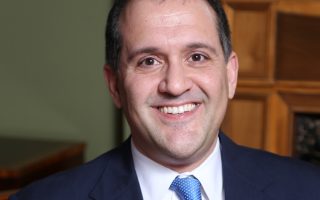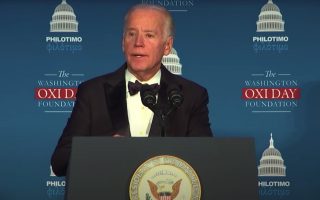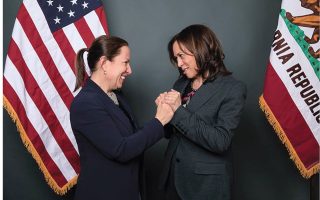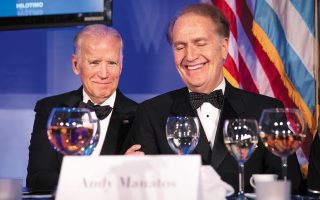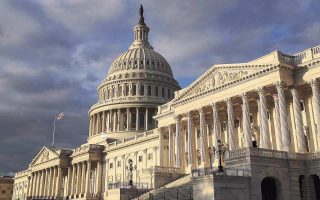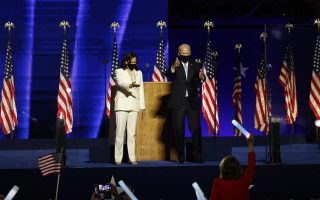Trump was not responsible for Jan 6 violence, ex-campaign aide tells Kathimerini
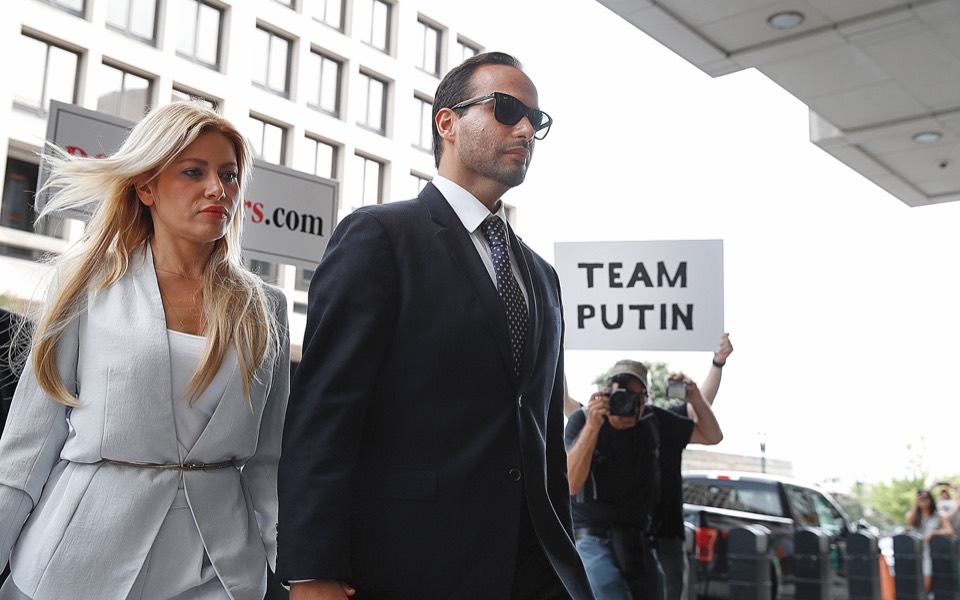
On January 5, a day before rioters stormed Capitol Hill, George Papadopoulos, the Greek-American former campaign aide to the US president, was at a rally in a Washington, DC square. It was a bitterly cold day, but outgoing President Donald Trump’s supporters patiently waited to listen to him and his former national security adviser Michael Flynn speak.
“Who won the election on the 3rd?” Flynn shouted. “Trump!” the crowd roared back. Papadopoulos took the stand, relaxed at first but soon riled up. “There are but two parties right now: traitors and patriots. And both are exposing themselves right now. You should not forget their names,” he shouted to the cheering crowd.
“What was the rally about and who organized it?” I asked him a week later on Skype. “I can’t remember. It was something like the ‘Stop the Steal’ organization. I don’t know what the name of the event was, but it was a very interesting rally. When I spoke, it was the day before. I wasn’t there for the day after, when then violence happened,” he says.
The former Trump adviser obviously wants to distance himself from the particular group which is being accused of methodically stoking public anger and mobilizing pro-Trump supporters behind the outgoing president’s narrative of election fraud.
“Who are the traitors you mentioned?” I ask the 33-year-old political scientist. “Well, obviously the people who did not want to look at the facts about what might or might not have occurred in the election. And I think that’s actually what instigated a lot of violence,” Papadopoulos answers.
I comment that CNN’s chief correspondent in Washington had used the exact same phrase (which actually belongs to former US president Ulysses S. Grant) about terrorists and traitors being the only two parties now, but was actually referring to Republican voters who continued to argue that the election result was fraudulent, even when such theories have been debunked by numerous courts.
“But that’s exactly what I mean,” Papadopoulos retorts, without missing a beat. “It’s like we’re living in two different worlds in America right now. We both feel like the victims. I don’t know how it will end up getting resolved.”
I ask whether the rhetoric he used in his speech and, of course, whether Trump’s overall stance had stoked this division and triggered the kind of extreme reactions we saw on Capitol Hill, also mentioning that the president called on the rioters to stand down but only after saying that they’re “very special” and “we love you.” Papadopoulos rejects the notion and argues that Trump is constantly being misunderstood.
“Anybody who’s been following the president, especially his supporters, would understand that he was not calling for any type of violence. The president condemned it,” he says. “And you know what? If you look back to last year, the Democrats were instigating political violence themselves. Kamala Harris was emboldening Black Lives Matter, saying that they are peaceful demonstrators, and they should continue to protest even though they were burning down cities. We normalized political violence in America along the left and that caused, I think, in many ways, this outburst on January 6.”
Papadopoulos’ relationship with politics – and with Trump – has been tempestuous. Even though he never made it to the White House, the young and ambitious Greek American did manage – albeit not as he’d hoped – to find himself at the center of the American political scene on several occasions. When he first heard that Trump was running for president in 2015, he remembers telling colleagues at the institute where he was working that he wouldn’t be surprised if he won.
“Everybody laughed at the idea, but I saw Trump like a stock. In order to profit from it, I had to buy low,” he said. He sent the campaign team an email outlining his interests, views and strengths: “Greece, Cyprus, Israel, pro-business, energy connections, relentless networker.”
A few months later he became the campaign’s – pro bono – foreign policy adviser and later, in this capacity, met the president of the United States. Trump called him an “excellent guy.”
With this important feather in his cap, Papadopoulos traveled to Greece and Cyprus, where he arranged a series of meetings that got him as far as the presidential mansions of both countries. One of his appointments in Athens ended in a Piraeus ouzo restaurant. “Panos was a gregarious, funny man and there was instant chemistry,” he says of Greece’s former defense minister Panos Kammenos. “Among others, we talked about his objective to have the United States move its nuclear weapons from Incirlik Air Base in Turkey to Souda Bay [on Crete].” During that same visit, he told then-Foreign Minister Nikos Kotzias of information he had received suggesting that the Russians had Hillary Clinton’s emails.
“Kotzias changed color and said, ‘Do not ever repeat that again,’” he says, admitting that he left Greece “anxious that I had made a fatal mistake.”
Indeed, his contacts across Europe in the runup to the 2016 election and his knowledge of Russian involvement had already put Papadopoulos on the radar of the Federal Bureau of Investigation. When Trump was elected in November, his phone started ringing nonstop, among others with a congratulatory call from Greece’s prime minister at the time, Alexis Tsipras.
The new president had very few people of his own to take over hundreds of political appointments and the overwhelming feeling in his campaign team was that they could pick a post. Two days after Trump was inaugurated, however, the FBI knocked on Papadopoulos’ door. The countdown had begun for him, and when he was proved to have lied to investigators probing Russia’s possible interference in the 2016 elections, he was convicted to 14 months in federal prison. Trump seemed to sever all ties with his campaign adviser at the time, but relations appear to have since grown warmer again. Papadopoulos would not confirm whether he is in communication with the outgoing US president, but he admits to being grateful.
“The only thing I would say about the president is if he distanced himself from me initially, that was probably the right move back then. In fact, he stayed out of my situation until he learned the facts. Then he endorsed my book. Then he began to retweet me and talk about me in a very positive light in interviews. And then he pardoned me. In the end, I think he did the right thing. And I appreciate it,” says Papadopoulos.
